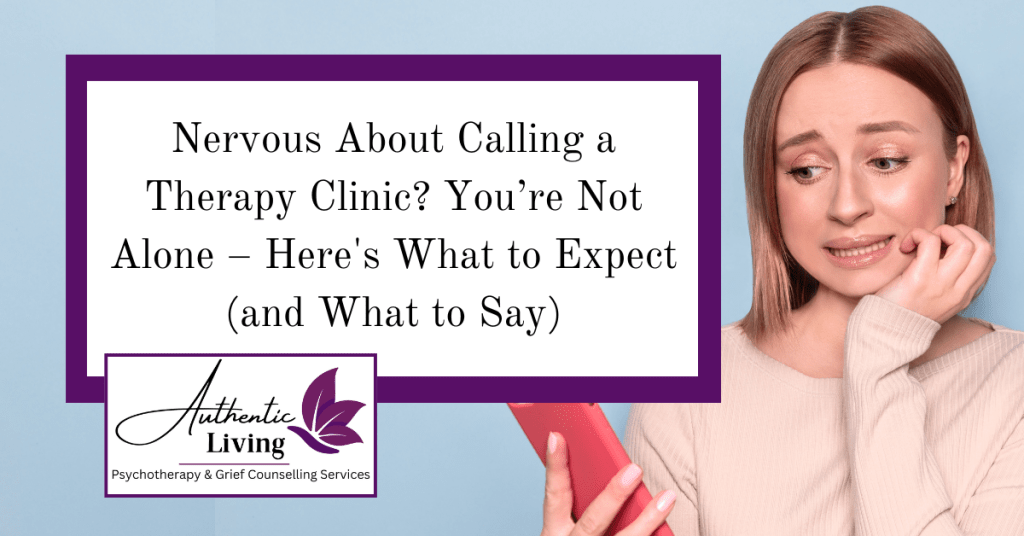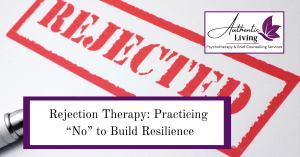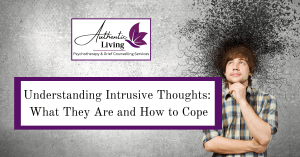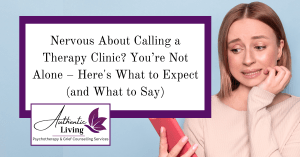Making that first call to a therapy clinic can feel overwhelming. You might stare at the number, heart racing, wondering what you’re even supposed to say. Or maybe you’ve picked up the phone a few times, only to hang up before anyone answers.
If this sounds familiar, you are not alone.
At Authentic Living London, we talk to many people who have been in that exact place—nervous, uncertain, and unsure whether they’re “doing it right.” Reaching out for help is an act of courage, and we want to make the process as easy and welcoming as possible.
Whether you’re thinking of calling for yourself or someone you love, this post will gently walk you through:
Why it’s normal to feel nervous
What to expect when you call a therapy clinic
What to say (with an easy sample script)
Common fears and how we respond to them
How to reach out in a way that feels right for you
Why It's So Hard to Make That First Call
For many people, calling a therapy clinic is the hardest step in the journey toward healing. It often comes after weeks, months, or even years of struggling alone. And when you finally decide to reach out, all sorts of worries can pop up:
“What if I cry or can’t talk?”
“What if I don’t know how to explain myself?”
“What if they think I’m being dramatic?”
“What if therapy isn’t for me?”
“What if I can’t afford it?”
Let’s pause here and name something important:
It makes sense that you feel scared. Talking about your mental health, especially to someone you’ve never met, can feel vulnerable. That fear doesn’t mean you’re weak—it means you’re human.
You might be holding grief, trauma, anxiety, or shame. You might be worried about being judged or misunderstood. Or you might just be so overwhelmed that you don’t know where to start. We understand.
We believe that when someone reaches out, it’s a gift. We’re not here to judge, fix, or analyze you. We’re here to listen, support, and walk alongside you.
What to Expect When You Call a Therapy Clinic
Every therapy clinic works a little differently, but here’s what usually happens when you call Authentic Living London:
1. You’ll talk to a real, compassionate person.
You won’t get a complicated phone tree or a robotic voice. A team member will answer, or you can leave a voicemail and we’ll call you back. (It’s true that sometimes you’ll get our voicemail, because we might be in a session with another client, but we are committed to returning a phone call within 2-3 hours max).
2. We’ll ask a few gentle questions.
These might include:
What brings you to therapy at this time?
Do you have a preference for in-person or virtual sessions?
Are you looking for grief therapy, anxiety support, trauma work, or something else?
We ask these questions not to dig into your pain but to help match you with the right therapist. We also aren’t looking for lots of details about your story when you call, just something simple like letting us know if the reason you are calling is “anxiety” or “relationship issues” etc,.
3. You’ll get information about next steps.
We’ll explain how the process works, what availability looks like, and give you a chance to ask questions. You can take your time and decide if it feels like the right fit.
What to Say When You Call (Even If You’re Really Nervous)
You don’t need to have the perfect words. You don’t need to explain everything right away. It’s okay to feel shaky, emotional, or unsure.
Here’s a simple script you can use when you call:
“Hi, my name is [Your Name]. I’ve been thinking about starting therapy, but I’m not really sure how this works or what to say. Can you help me figure out where to begin?”
That one sentence is enough to start the process. Here are a few other variations you could try:
“I’m going through a hard time and I think I might need someone to talk to.”
“I saw your clinic online and I’d like to know more about starting therapy.”
“I’m not sure if I’m a good fit for therapy, but I’d like to ask some questions.”
If you don’t want to call, you can also email us or text us. Some people find that easier.
What Happens After You Call
After we speak with you, here’s what usually happens next:
You’re matched with a therapist. We consider your needs, preferences, and scheduling availability.
You receive intake forms (online and easy to fill out).
You book your first session—no pressure, and you can take time to decide.
You meet your therapist and begin your journey toward healing.
Your first session is about getting to know each other. You’ll talk about what’s bringing you in, your goals, and what therapy might look like for you.
There is no commitment to continue if it doesn’t feel right—we want you to feel in charge of your experience.
We’re Here When You’re Ready
It’s okay if you’re not ready today. Sometimes just reading a blog like this is the first step. You can come back to it tomorrow. Or next week. Or whenever it feels right.
But if you are ready—even just a little—we invite you to take the next step. Whether you’re looking for grief therapy, therapy for anxiety or trauma, or just someone to talk to who gets it, we’re here.
Common Fears About Calling a Therapy Clinic – And Reassurance for Each One
Starting therapy can bring up a lot of “what ifs,” and we’re here to meet each one with compassion.
If you cry on the phone, know that it’s welcomed—tears are a natural, honest response to pain. If you’re unsure of what to say, you’re not alone; we’ll gently guide the conversation, starting right where you are. Worried your problems aren’t “bad enough” for therapy? If it’s on your heart or mind, that’s more than enough reason. We also believe therapy isn’t just for crises—it’s a space for growth, clarity, and connection. If finances are a concern, our intern therapist program offers flexible, pay-what-you-can options with no questions asked. And if you’ve had a hard experience with therapy in the past, we understand. We’re committed to creating a space that feels safe, respectful, and genuinely human—one where you can move at your own pace and maybe, just maybe, find something that feels right this time.
- 1. “What if I cry on the phone?”
- 2. “What if I don’t know what to say?”
- 3. “What if my problems aren’t bad enough for therapy?”
- 4. “What if I can’t afford it?”
- 5. “What if I’ve had a bad experience with therapy before?”
You Don’t Have to Navigate This Alone
Calling a therapy clinic doesn’t have to be perfect. It just has to be real. You don’t need the right words—you just need to reach out. We’ll meet you wherever you are, with care and compassion.
Because you deserve support. You deserve to feel understood. And you don’t have to do it alone.
Reaching out for support can feel overwhelming—especially if you’re unsure what to say, worried about crying, or questioning if your struggles are “big enough” for therapy. Lizanne Hills understands this deeply. As a skilled and compassionate therapist, she offers a calm, welcoming space where you don’t need to have the perfect words—just a willingness to begin. With a focus on grief, trauma, addictions, life transitions, family and couples therapy, children’s grief, and autism spectrum support, Lizanne walks alongside clients of all ages as they navigate pain, growth, and change. Whether you’re facing loss, relationship challenges, or simply seeking clarity, Lizanne meets you exactly where you are—with respect, warmth, and the belief that healing is always possible. She also offers affordable support through flexible and accessible therapy options to ensure care is within reach.

Lizanne Hills
Registered Psychotherapist -Qualifying Addictions Certificate
Areas of Focus: Grief, Addictions, Family Therapy, Couples Therapy, Trauma/PTSD, Children’s Grief, Autism Spectrum Disorder, Life Transitions





